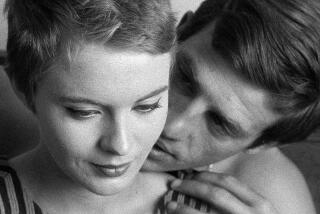Making the Most of Time : John Goddard’s resume makes it clear that the world is his workplace, but you won’t find his age listed.
- Share via
John Goddard scoffs at those of us whose idea of roughing it is a room that doesn’t face the pool or no breath mint on the pillow.
He’s Don Quixote in a kayak, a Land Rover, a supersonic jet. He’s a lifelong adventurer-explorer who has forged a film-lecture career out of dreaming impossible dreams, of doing extraordinary things, of making peace with Mother Nature while waging war against Father Time.
His workplace encircles the world. His career path stretches from jungles to rapids to stratosphere. His resume shows visits or expeditions to 121 countries. Most notable are forays in the 1950s that made him the first ever to explore the length of the world’s two longest rivers--4,160 miles down the Nile and 2,700 down the Congo.
What Goddard’s resume doesn’t show is the year he was born.
“Everybody is so hung up on age,” he says. “We grow up either too old or too young. We associate so many frailties with age that they become a self-fulfilling prophecy. It’s a cop-out. When somebody says, ‘I can’t do that--I’m 65 now,’ I say, ‘Nonsense!’ ”
Trim, ebullient and defying what appears to be an age when most men are retired or thinking about retiring, Goddard now mostly travels the lecture circuit.
His themes of goal-setting and self-fulfillment are embodied in his next lecture--titled “Conquering the Impossible”--from 7 to 10 p.m. Wednesday at Learning Tree University in Chatsworth.
“In the ‘70s and ‘80s, people drove themselves only to make more money,” Goddard says. “Now, in the ‘90s, they realize that there’s so much more to life--that if you also invest in health, in education, in culture, then good will come from them.
“Money gives you independence and buys you time, of course--but if your goal is only money, you’ll almost always end up disappointed. So you pay off the mortgage. Then what? It’s never enough.”
A fellow adventurer, who as a Glendale teen-ager during the 1950s heard Goddard lecture about his journey down the Nile, became so favorably impressed that he now books safaris and other tours led by Goddard.
“He’s truly amazing--he can be comfortable anywhere ,” says Colin Sandell, 49, a former Southern California resident who now lives in Cedarburg, Wis. “He challenges people by telling them: ‘You can do it if you want to.’ ”
Indeed, Goddard--born in Utah and reared in Los Angeles--clings to a personal credo: “To dare is to do. To fear is to fail.” At 15, before graduating from USC where he majored in anthropology and psychology, he listed 127 personal goals.
He says he has achieved 106--notably climbing Mt. Kilimanjaro, exploring Australia’s Great Barrier Reef, studying primitive cultures in Borneo, Brazil and New Guinea, and traversing the Nile and Congo rivers.
A World War II combat flier, Goddard has also set records as a civilian jet pilot: 1,500 m.p.h. in the F-111 fighter-bomber and an altitude of 63,000 feet in the F-106 Delta Dart.
Among his unfulfilled goals: visiting the moon (“My chances are slim,” he concedes) and living to see the 21st Century.
Of Goddard’s zest for reaching for stars, longtime friend Ardean Watts of Salt Lake City says: “I don’t have to entertain this man. I think of him as having an adventurous mind, rather than just as an adventurer. And he’s always had this utter respect for the Earth and the environment, long before it was fashionable.”
Trips the two of them made to Yellowstone National Park, Watts recalls, showcased Goddard’s affection for animals.
“A creature in the road--whether it was a skunk, a snake or a bobcat--would force John to stop the car and get out,” he says. “Before you knew it, John had the creature cradled in his arms. Even when he finds a stray cat in his neighborhood, there’s instant bonding.”
A tour of Goddard’s ranch-style house and spacious back lot in La Canada Flintridge reveals other inhabitants besides himself, his wife, Carol, and two of their children: two horses, three cats, two dogs, two cockatiels, two parakeets and Ian, a 16-foot-long python from Burma.
On display inside the house are countless treasures--some thousands of years old--from Goddard’s travels: a sculptured wooden likeness of a Mangbetu tribe warrior’s skull from Zaire, a flintlock teak musket (circa 1815) from Afghanistan, a blowgun that shoots poison-tipped darts, and a 6-foot, 6-inch steel spear, carved out of a train rail, from a Masai tribe in Tanzania.
“It’s flexible,” Goddard says, bending the blade slightly. “If you throw this at a rhino or a lion, and if it hits the bone, it’ll go right on through.”
He grins. “To obtain this,” he says, “I gave someone two goats, a khaki shirt, a flashlight and some shillings.”
His kinship with so many primitive cultures in Africa and South America, Goddard says, has taught him that they can be more civilized than societies in America and Europe.
“The simpler the society, the stronger the values,” he says. “You can go into a village where they’re impoverished by our standards. You’ll see a strong family solidarity. You’ll see people accepting responsibility to be honorable. You’ll see a value system that is devoid of materialism. People there are so refreshingly innocent that they would offer you their last slice of bread or whatever they had, with no thought about ‘what’s in it for me?’ ”
Next on his itinerary, Goddard says, is a flight at the controls of an F-15 Eagle jet in September at Edwards Air Force Base, then a safari with 32 others next summer to Kenya and Tanzania, his 13th trip to those countries.
“I don’t believe in retirement,” he insists.
John Goddard says it with a belief in himself as unshakable as his disdain for Father Time.
WHERE AND WHEN
What: “Conquering the Impossible,” a lecture by explorer John Goddard.
Location: Learning Tree University, 20920 Knapp St., Chatsworth.
Hours: 7 p.m. Wednesday.
Price: $49; couples, $79.
Call: (818) 882-5599.
More to Read
Sign up for The Wild
We’ll help you find the best places to hike, bike and run, as well as the perfect silent spots for meditation and yoga.
You may occasionally receive promotional content from the Los Angeles Times.






